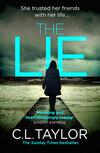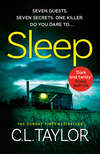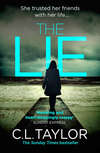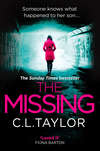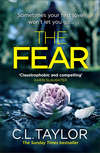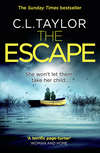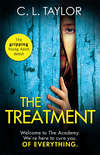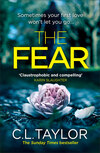Kitabı oku: «The Lie», sayfa 4
“Didn’t you see it? It was right next to the bottle.”
“Was it? I can’t see a thing in this light. Come on.” She loops her arm through mine. “Let’s go and see what the other two are up to.”
Chapter 9
“You okay?” Al touches the back of my hand. “You didn’t come to breakfast.”
“I couldn’t find my tablets.”
We’re sitting on the back seat of the rusty, ramshackle bus that will take us to the base of the mountain so we can trek up to the retreat. It’s a lot more rickety than the bus that took us from Kathmandu to Pokhara but, according to Leanne, this journey will only take half an hour rather than a six-hour slog. I made it on the bus first and took a seat by the window, folding up my waterproof jacket to cover the springs poking through the ripped leather seat. Al, Leanne and a sunglasses-wearing Daisy filed on several minutes later. Al immediately tucked herself in next to me.
“Not your malaria tablets?”
“No, the anti-anxiety ones. I looked everywhere. I’m sure I packed them.”
“They’ll be in a side pocket, or something. Don’t worry, I’ll help you look once we get to Skanky Yaka, or whatever it’s called.”
“Cheers, Al.”
We lapse into hungover silence. We didn’t carry on drinking for long last night. When we returned to the patio, Leanne had already gone to bed, and, with no sign of the hotel manager, we only had Daisy’s half bottle of wine to drink between the three of us. By the time I dragged myself into the room I was sharing with Leanne, she was snoring softly.
I glance across the bus. Leanne’s laughing uproariously at something Daisy’s just said. She looks remarkably fresh-faced in her My Little Pony T-shirt and skinny jeans, while Daisy looks like she dragged herself out of bed and crawled into her clothes. She notices me staring and presses a hand to the side of her head.
“You as hungover as me?” she asks.
I nod. “I feel like hell.”
Satisfied with the response, she sits back in her seat and whispers something to Leanne, who glances at me and laughs.
I close my eyes to try and conjour up the memory of Daisy stamping on the gecko, but the images in my mind are blurred by my hangover and lack of sleep. If she couldn’t focus on me without her contact lenses in, and I was sitting across from her on the bench, how could she even have seen it? I’m misremembering what happened. I have to be. There’s no way she deliberately stamped on a living creature, not after the accusations her mum levelled at her when her sister died.
Al snorts with laugher beside me, and I open my eyes.
“I don’t suppose you got a photo of that gecko, did you?” she says. “I just remembered I was supposed to get my camera, but I was so obsessed with finding more booze I completely forgot about it.”
“No.” I shake my head. “No, I didn’t.”
“No worries.” She shrugs. “I’m sure we’ll see loads more.”
Thankfully, we arrive at the Maoist station within minutes. Their desk is on a platform at the end of the rickety bridge that connects the café at the base of the mountain with the start of the trail. None of us are shocked to see them there – you’re warned about the “tourist tax” in all good guidebooks – but the guns they clutch to their sides take us all by surprise. Shankar, our trek guide, nods for us to approach. I try to read his expression. While many Nepalese people support the Maoists, others are fearful of them. But Shankar’s eyes give away nothing of his thoughts.
Daisy approaches the desk first, her shoulders back, chin high. She runs a hand through her hair and smiles at the man behind the desk as she hands him her passport, trek visa and 150 rupees, but he doesn’t acknowledge her. His expression doesn’t change as he flips through the passport and then slides the money to the man at his left, who slips the notes into a money belt around his waist. Daisy reaches for her passport then jumps as the man slaps his hand on top of it.
“I tell you when to take,” says the man behind the desk. He stares at her for an unbearably long time then lowers his eyes to her visa on the desk in front of him. He flips the passport open again and compares the name on the visa with the name on the passport, then looks back up at Daisy.
“Why you here?”
“Um …” She clears her throat. “Just to trek up to the summit.”
Leanne has told us what to say. She seems to think the Maoists will charge us extra if they think we’re going to be staying in a Western establishment rather than one of the Nepalese-owned hostels.
“You sure about that?” He continues to stare at her.
“Of course. I’m dying to see the view from the top. It’s supposed to be amazing.”
He pushes Daisy’s possessions across the desk towards her then dismisses her with a wave of his hand. He doesn’t speak to Al, Leanne or me, and our documents are processed wordlessly. When we’ve been checked, the two armed men standing either side of the gate take a step back to let us enter the trail.
Daisy grabs my arm the second we’re all through. “Wow.” She pushes her sunglasses onto the top of her head. She has bags under her eyes, and dozens of red blood vessels streak the white around her eyeballs. “That was mental.”
She releases me and links her arm through Shankar’s before striding off up the path. If she notices him flinching at the unwanted physical contact, she doesn’t let on.
The muscles in my thighs burn from weaving my way from left to right and back again as I climb the three thousand steps up the Annapurna mountain. I was expecting actual steps – I think we all were – but these aren’t evenly sized concrete blocks; they’re slabs of rock, dug into the side of the mountain, so uneven and wonky you have to look where you’re placing your feet. They’re the rustic, higgledy-piggledy winding steps of a fairytale. Or a nightmare. With the exception of Al, we all go to a gym back home in London, but running 5K in thirty-three minutes on a treadmill prepares you for this in the same way that jumping in puddles prepares you to swim the English Channel.
It’s 2 p.m. and Shankar is leading the way, leaping from stone to stone, as enthusiastic and energised as he was when we started our trek five hours ago. Daisy and Leanne follow in his steps, both breathing heavily, both swearing whenever they look up and see how many more steps there are to go until we reach the end of the trail. Green mountains striped with brown paddy fields and capped with snowy peaks wrap around us, hiding us from the rest of the world. I have never been anywhere so breathtakingly beautiful or so back-breakingly harsh. We passed donkeys earlier, roped together, stumbling up the steps with huge saddle bags strapped to their backs, their knees buckling, their hooves slipping under the weight of their heavy loads. One of the donkeys was carrying a fridge, strapped on top of its saddle bag like it was the most normal thing in the world. Watching the poor animals climb and stumble, heads down, eyes sad, was more than I could bear. I wanted to set them free and tell their handler that he was cruel for forcing them to live such a miserable life, but I bit my tongue.
Al trails behind me, her face puce, her enormous backpack waving from side to side with each step she takes, the belt undone around her waist, her hands on her hips. Every dozen or so steps she stops, takes a puff of her asthma inhaler and continues on again. If I were Al, I’d ask to slow down or take more breaks, but she’s ox-like in her determination to get to the retreat before nightfall and hasn’t complained once. I hear the puff-puff of her inhaler and stop walking. That’s twice in the last five minutes.
“You okay?”
She shrugs off her backpack then bends forward and grips her knees with her hands. She sucks at the mountain air like a fish on a hook.
I put a hand on her shoulder. “Stand upright if you can. Leaning over like that squashes your lungs.” My brother Henry had asthma as a child, so her attack doesn’t faze me. Though the fact that we’re 3,500 metres above sea level and at least five and a half hours away from the nearest hospital does.
Al straightens up, puts her hands on her hips and cranes her chin towards the sky as she continues to gulp in air. Her cheeks are still a violent shade of red, but it’s not them I’m looking at. It’s her lips. They’re pink, not blue. That’s a good sign.
“Nice deep breaths,” I say. “Slowly. Don’t panic. In … and out … in … and out … Relax your shoulders. You’re tensing them because you’re scared. Relax your shoulders and exhale for as long as you can, then a nice deep breath in again.”
I can hear Daisy’s voice in my head as I speak, saying the exact same words to me a couple of months ago when I was in the grip of a panic attack. We were in a crowded cinema, people filling every seat, and it was hot, really hot. We were watching a thriller Daisy wanted to see and each time the main character jumped, I jumped. Each time she saw shadows where there weren’t any I saw them too. As her world grew smaller and more claustrophobic, so did mine, and I became convinced that there wasn’t enough air in the cinema for everyone to breathe, and I had to get out.
“Everything okay, miss?”
Our guide nimbly picks his way back down the mountain towards us, his tiny rucksack strapped to his back. Shankar’s weather-beaten face is as lined as befits a man in his late forties, but he moves like a man twenty years younger.
“She breathe okay?” he asks as he reaches us.
“No. She’s not. I think the altitude might be affecting her asthma. Maybe we should go back down.”
“No!” Leanne says so loudly I jump. I hadn’t realised she and Daisy had joined us too.
“I’m sorry?”
“We … we should carry on,” she says, the base of her neck colouring. “It can’t be much further to the retreat, and they might have a doctor or a nurse there.”
“But if the altitude is making her asthma worse, the best thing for her to do is go down again,” Daisy says.
I nod in agreement. Thousands of people do this trek every year, but occasionally people die. None of us wants to be part of that statistic.
“I still think we should continue to the retreat,” Leanne says. She glances from Al to the steps, as though she’s desperately hoping Ekanta Yatra will magically appear before us. “We’ve come this far. It would be such a shame to give up now. You can make it a little bit further, can’t you, Al? We can take it slowly, take lots of breaks. And like I said, I’m sure there will be someone there who can help.”
Daisy and I exchange a look. Normally, Leanne would be the first to put her best friend’s health before everything and charge down the mountain to get help. And then there’s the fact that she’s disagreeing with Daisy. That never happens.
“Yeah, yeah, we heard you,” I say, “but conjecture isn’t going to magically conjure up a nebuliser, is it? Are there doctors and nurses up there or not?”
Leanne shrugs. “I don’t know. Probably. There are a lot of people there from different professions, and—”
“We’re going back down.” Daisy holds up her hands. “We’re not gambling with Al’s health. Come on.” She gives Leanne a small shove. “Let’s go.”
“No!” Leanne twists sharply to one side and, for one heart-stopping second, I think she’s going to hit Daisy. “You can go back down if you want, but I’m—”
“Could everyone please stop talking about me as if I’m dead, or something!” Al steps out from beside me and holds up her hands. “I am here, you know. Seriously, I appreciate the concern, guys, but no one is going to miss out on the holiday of a lifetime just because I’m a twenty-a-day lard arse with crap lungs and a heavy load.” She pats the roll of flesh that overhangs the waistband of her black combat shorts.
Daisy shakes her head firmly. “Nice speech, but no one loves a dead hero.”
“Fuck off, Dais!” Al laughs then looks at Shankar. “How much further have we got to go? Like, how many more hours?”
He shrugs. “Thirty minutes, maybe forty?”
“All right, then.” Al reaches down for her backpack but Shankar grabs it first. There’s a stand-off as they each hold a strap and lock eyes, urging the other to back down. Normally, there’s no way Al would ever let a man do something she’s capable of doing herself.
“Miss. I carry. You breathe.” There’s a quiet tenacity to the way Shankar speaks, and although Al shakes her head, I can see her resolve waver. Her high colour has paled but she’s still breathing shallowly.
“I’ll take yours,” she says, reaching for the smaller rucksack on the guide’s back. “We can swap, but only until I’ve got my breath back. Five minutes, ten minutes tops.”
Forty-five minutes later, Shankar shrugs off Al’s backpack, flipping it onto the ground as though it’s a pillow, and points to the building down a small track to our left. “We are here.”
Rising out of the white blanket of cloud that surrounds us are three separate houses, linked by fenced walkways, their three-tiered roofs silhouetted against the landscape like Chinese temples. The window frames are painted in shades of red, ochre and turquoise, and stone steps lead up to an enormous wooden door on the front of the main house. A high wall runs around the perimeter of the grounds, a large wooden gate closing the retreat off from the world. Prayer flags flutter in the wind and the sound of laughter drifts across the breeze.
“Wow.” I unbuckle my own backpack, twist my body sideways so the pack drops to the ground, lean back and groan with pleasure and relief as I press my shoulder blades together.
Daisy skips towards Leanne, grips her arm and presses her cheek against the top of her shoulder. “Oh, my God, it’s even more gorgeous than it looked on the website.”
Leanne grins at the compliment, drops her backpack and wraps an arm around Daisy. “Told you! And you all thought I was going to bring you to some kind of shack.”
“Actually,” says Al, climbing the last few steps, “I thought we’d be sitting in a paddy field, meditating for twelve hours a day before being force-fed mungbean sandwiches.”
“The paddy fields are back down the mountain,” Leanne says, pointing. “Off you go!”
“There’s the river!” Daisy lets go of Leanne and points excitedly into the distance. I strain to see through the trees then spot something blue and shimmery. “Is that the waterfall I can hear?”
“Probably.” Leanne reaches for her backpack and hauls it back onto her shoulders. “Come on, they’re expecting us.”
Daisy squeals and hurries after her as she makes her way down the track. I wait for Al to catch up. She slips Shankar’s rucksack off her shoulders and hands it to him. He slips it on effortlessly.
“Thank you.” She holds out her right hand. “I couldn’t have made it up here without your help.”
Shankar shakes her hand while simultaneously touching his left hand against his right forearm as a sign of respect. “No problem, miss.”
“For you.” Al reaches into her pocket and pulls out a hundred rupee note. “Please.” She presses it into his hand.
He accepts the money with a smile and tucks it into the little leather wallet attached to his belt, then turns to go back down the mountain.
“You’ll come in?” I say. “The least we can do is offer you a sandwich and a cup of chai. I’m sure the owners won’t mind.”
The smile slips from his face. “No, thank you.”
“Please, you can’t walk all the way back down again without a break. It wouldn’t be right.”
His gaze flicks to the left, to the retreat at the end of the track. “No.” An emotion I can’t read flickers across his face, and then it’s gone.
“But …” The words fall away as Shankar turns on his heel and, without another word, starts back down the mountain.
“Emma, Al, come on!” the girls shout from below us.
A tall man with shoulder-length black hair, wearing cut-off camouflage trousers and a grey long-sleeved T-shirt, is standing beside them, holding the gate open.
“Hi,” the man shouts, raising a hand in greeting. “I’m Isaac.”
Chapter 10
Present Day
Sheila sent me home, no questions asked. She heard me throwing up in the ladies’ loo and immediately diagnosed me as suffering from an upset tummy. She didn’t even give me the opportunity to object.
“I saw you nibbling the corner of that sandwich and I knew something was wrong. It’s not like you not to have an appetite. Get yourself home, Jane. We don’t want to risk you passing it on to everyone else. We’re short-staffed as it is.”
I think she would have driven me home herself if I hadn’t pointed out that I had my bicycle with me. No point driving me home when I only live a five-minute cycle away and it’s all downhill.
That was two hours ago. I’ve spent the last thirty minutes sitting in front of my laptop. I thought it would be harder to find Al. I thought that, after five years, she’d be impossible to track down, but, unlike me, she hasn’t changed her name. She’s even got a Facebook profile. Alexandra Gideon. There were only three listed and two of them live in the States. Her cover image is of Brighton seafront and the profile picture’s a rainbow, and that’s it, that’s all the information I’ve got to go on, but I know it’s her. She always said she wanted to leave London and move to Brighton.
It’s been four years since we last spoke. We kept in touch for the first few months after we got back from Nepal, talking on the phone every day, trying to make sense of what had happened, but then Al sold her story to the press and everything changed. I couldn’t understand why she’d done it. I called her, over and over again, begging her to explain why she’d gone back on what we’d agreed, but she ignored my calls. I don’t know if it was the money or the attention or what, but it was the worst kind of betrayal, especially after everything we’d been through.
I hold down the delete button and the cursor zips from right to left, swallowing the message I’ve been trying to compose for the last half an hour. I start again:
Al, it’s me.
No. I created this Facebook account as Jane Hughes, and she won’t know who that is.
Al, it’s Emma. I know you probably don’t want to talk to me, but I need your help.
I delete the last sentence.
Al, it’s Emma. I think Daisy’s still alive. Please contact me. Here’s my mobile number …
I touch the button beneath the swipe pad, ready to click send, but then change my mind again. Does she already know? Whoever typed the message onto the Green Fields’ website could already have contacted Al. If I found her in minutes, they could have, too.
I reach for my mobile and click on Will’s name. The call goes straight to voicemail. His tone is professional and impersonal but the sound of his voice is comforting.
“Hi, Will, it’s Jane. Could you give me a ring when you finish school? I need to talk to you; it’s important.”
I place the phone on the desk next to the laptop. I stare at the screen, drumming my right index finger on the button under the swipe pad.
Delete or send? Delete or send? My heart tells me to trust Al. My head says not to.
I click send.
The second Will sets eyes on me, he gathers me into a tight hug.
“Sorry, darling. I thought I’d mentioned that it was parents’ evening tonight.” He pulls away, his hands on my shoulders. “You okay? You sounded worried on the phone.”
“Yeah … I …” I hand him a bottle of red wine. “I’ve had a bit of a weird day and …” The sound of two people talking drifts towards us as a couple of dog walkers stroll past the end of Will’s garden, their high-visibility jackets glowing in the light from the house. “Can we talk inside?”
“’Course, yeah.” He reaches an arm around my shoulders and ushers me into the house.
It’s warm and bright in the hallway. Dozens of black and white photos of Will and Chloe, and Will and various friends and relatives, smile down at me from one wall. On the other is a faux Banksy print of a large Star Wars AT-AT walker saying, “I’m your father” to a smaller AT-AT walker (I only know what they’re called because Will told me).
“I need to explain why I was being so obtuse last night,” I say as I head towards the living room. “The reason I was asking about lying was because—”
“Hi, Jane!” Chloe waves at me from the sofa where she’s sitting cross-legged with a loom band maker in one hand and a crochet hook in the other. She doesn’t shift her gaze from the Disney movie blaring out song tunes from the television in the corner of the room.
“Hello!” I glance questioningly at Will. He normally only has his daughter at weekends during term time.
“Ah, yes, Chloe … the other reason it took me a while to get back to you. Sara rang during my last meeting. She sliced her thumb on a food processor blade and needed me to take Chloe so she could go to A&E.” He glances at the clock above the fireplace. It’s after nine. “We agreed it would be best if Chloe stayed here for the night. God knows how long it will take her to be seen.”
Sara is Will’s ex-wife. They’re separated, but amicably so. According to Will, their relationship gradually became more like brother and sister in the years after Chloe was born, but it wasn’t until Sara admitted that she’d developed a bit of a crush on a colleague and Will felt feelings of relief rather than jealousy that they confronted the issue. Sara went on to have a relationship with her colleague, but it fizzled out almost as quickly as it began.
“Here” – he thrusts my bottle of red wine at me – “why don’t you go into the kitchen and get this opened while I take Chloe upstairs? We can have a proper chat once she’s in bed.”
“Okay.”
“I can make a bracelet for you, if you want, Jane!” Chloe says, waving the loom board at me. She’s got the same generous wide smile as her father. “What are you favourite colours? Or I could make you a rainbow one, if you like.”
“A rainbow bracelet would be wonderful.”
“I could make collars for the animals you look after, too. Or you could sell them in the sanctuary to raise money for—”
“Bed!” Will says, with a smile on his face. “You’ve seen Jane now. No more excuses, let’s get you upstairs.”
Chloe’s face falls. “But …”
“We can talk about your ideas this weekend, Chloe.” I glance at Will, who nods. “In fact, we could discuss them at Green Fields. I’ll give you the VIP guided tour.”
“No way!” Chloe throws her loom bands to one side and runs at me. She wraps her arms around my hips and buries her head in my stomach.
I rest a hand on the top of her fine, mousey hair.
“You’re very lucky, you know,” Will says. “They don’t let just anyone wander around Green Fields.”
“I’m afraid you won’t be able to meet the dogs,” I add. “They get upset when too many strangers visit.”
“That’s okay.” Chloe gazes up at me. “I only really want to see the cats and the ferrets and the mice. And the swearing parrot.”
“The what?” Will pretends to look aghast, and Chloe giggles. “I’ll pretend I didn’t hear that. Come on, teeth time.”
“Night, Jane.” Chloe gives me another squeeze then skips past her father and climbs the stairs, two at a time.
Will and I exchange smiles then he presses a hand to my cheek. “Thank you. You’ve made her very happy.”
I shrug. “It’s nothing.”
“Still …” His gaze lingers, the emotion behind his eyes weighty and intense. We had a discussion on our third date about how neither of us wanted to get into anything “heavy”, and we’re still not officially “together”, even though Will insisted I meet Chloe three weekends ago. We “bumped into” each other while they were feeding the ducks at the pond in the centre of the village, and he introduced me as “my friend Jane”. She accepted the introduction unquestioningly, but her eyes grew wide and round when I told her what I do for a living. She’s been badgering her dad to spend time with me ever since.
My chest tightens with anxiety. I shouldn’t have told Chloe about visiting the sanctuary this weekend, not when I’m about to tell Will that I’ve been lying to him since the moment we met. I got carried away by her excitement; I forgot that none of this is real.
“I should open the wine.” I touch his hand briefly then break eye contact with him and step away. “Give Chloe a goodnight kiss for me.”
He turns and heads for the stairs. Like his daughter, he takes them two at a time then disappears into the bathroom off the landing.
It’s cooler in the kitchen than the rest of the house. Will’s cooking prowess is demonstrated by the well-stacked spice rack to the right of the cooker and the shelf full of cookery books, the pages rippled and stained. The wine rack to the left of the cooker is well stocked with a variety of red, white and rosé bottles and two magnums of champagne, and there’s a plentiful supply of chocolates in the cupboard above the mug tree, too – presents from grateful parents, no doubt.
I dig around in the cutlery drawer until I find the bottle opener then yank the cork out of the bottle of red wine. I don’t wait for it to breathe. Instead, I half-fill the largest wine glass I can find in the mis-matched selection in the cupboard and down half of it. Then I refill the glass and pour another one for Will.
As footsteps reverberate on the ceiling over my head, I wander down the hallway and back into the living room. I turn off the television, tidy the spilled loom bands into their correct colour compartments then, with nothing else to do, I sit on the sofa and reach for Will’s iPad.
I swipe from left to right to unlock the screen, Will only bought his iPad a few weeks ago and he still hasn’t got round to setting a password. I sent Al the message at seven o’clock. Has she read it? If she’s as addicted to Facebook as half the girls at work, she’ll have read it the second her phone bleeped with a new message notification. She may even have replied.
The sound of Will’s laugh and Chloe’s high-pitched giggle floats down the stairs as I log into Facebook.
The messages icon at the top of the screen is still blue. No message from Al. She hasn’t even read it yet. I’m just about to log out when I notice there’s another tab open in the browser. Will’s been reading a tabloid newspaper online – one he’s ranted about several times. I click on it.
The headline alone fills a third of the page.
HUMILIATED, ABANDONED AND BETRAYED.
BRITISH WOMAN ESCAPES DEADLY CULT THAT ROBBED HER OF
TWO OF HER FRIENDS AND NEARLY STOLE HER OWN LIFE.
Alexandra (Al) Gideon, 25, from London talks exclusively to Gilly McKensie about the dream vacation that turned into a holiday from hell when she and her three friends – Daisy Hamilton, 26, Leanne Cooper, 25, and Emma Woolfe, 25 – journeyed to Nepal. Now Al puts the record straight about what really happened and the mystery behind Daisy and Leanne’s disappearance …
I stop reading. I already know what it says. It’s the article Al sold, the reason we haven’t spoken for four years.
But why has Will been reading it? There’s no way he could connect me with that story. Unless …
I reach into my back pocket, but the note’s not there. It’s still in my work trousers, lying in a crumpled heap on my bathroom floor after I took them off to have a shower after work. Did the same person who sent me the note contact Will to tell him I’m not who he thinks I am? That might explain the real reason he didn’t reply to my voicemail for a couple of hours – he wanted to check me out on the internet first.
A floorboard creaks above my head.
Unless he was the one who sent the note?
I reach for one of the school exercise books on the coffee table and flick through it. On one of the pages there’s an image of a plant, drawn in pencil, with the various parts labelled in school kids’ untidy handwriting – stem, stamen, petal, etc. Underneath, written in blue biro, are the words:
A great piece of work – well done.
The handwriting is small and neat.
The floorboard creaks again, louder this time and, panicking, I reach for my messenger bag, slip the book into it then walk into the hall.
“Sorry, Will,” I shout up the stairs. “I’ve got to go. There’s been an emergency at work.”
“Hang on, Jane,” he shouts back. “I won’t be a—”
The door clicks shut behind me before he can finish his sentence.
